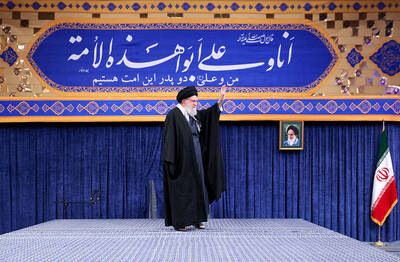Most Austrians -- and most of the country's major political parties -- vehemently oppose Turkey's bid to join the EU. But it's election time in Vienna, and suddenly those same parties are courting the local Turkish vote.
So how do you meld the conflicting interests of appealing to the mainstream Turkophobe Austrian electorate while catering to voters of Turkish origin whose ballot will make a difference in yesterday's capital's election?
"It's tough occasionally," conceded Nurten Yilmaz, an Austrian of Turkish origin, as she took a break from handing out red balloons and folders urging voters -- Turkish and otherwise -- to vote for her Social Democratic Party.
Only one of the five parties running for City Hall -- the xenophobic Freedom Party -- is not fielding a Turkish candidate. Instead, it appeals to the rabidly anti-Turkish fringe vote with posters declaring "Liberated Women instead of the Mandatory Headscarf," and "German instead of `Don't Understand.'"
But with most of Austria's 200,000-strong Turkish community living in Vienna, a city of about 1.5 million people, the other parties cannot ignore their vote.
Many Turks here are skeptical of their sudden popularity -- and with reason.
"I've been here for 20 years but I'm still not fully accepted," Mehmet Akar said in strongly accented German as he stopped at Yilmaz's stand in Vienna's 16th District, where kebab stores are next to shops offering more traditional Austrian goods.
Recent EU surveys show only one in 10 Austrians backs the idea of Turkey joining the bloc. Austria tends to have little political clout in the EU. Yet it took days of intense pressure from the bloc's 24 other member states for Vienna to abandon its attempt earlier this month to scuttle talks with Turkey on future full membership.
Critics say that local politics played a part, with Chancellor Wolfgang Schuessel hoping -- but failing -- to swing voter sentiment behind his conservative People's Party in the province of Styria by demonstrating his party's unbending opposition to Turkish EU membership.
In Germany, the other EU nation with a large Turkish-origin electorate, the governing Social Democratic party supported Turkey's bid to join the EU, while the opposition Christian Democratic Union (CDU) objected. The resulting Social Democratic vote among Germany's 2.6 million-strong Turkish community is thought to have contributed to the unexpectedly good showing by the party that left the favored CDU with little choice but to form a coalition with its traditional rival.
In Austria, there is no such clear divide on the Turkish question. But the People's Party -- the governing party nationally -- seems to be fighting an uphill battle because of its vehement opposition to Turkish EU membership.
Turkish candidate Sirvan Ekici repeatedly canceled appointments with a reporter wanting to accompany her during campaigning. Even the rightist BZOE has fielded a candidate of Turkish origin, despite past opposition to immigrants by its leading figures, including populist firebrand Joerg Haider.

Shamans in Peru on Monday gathered for an annual New Year’s ritual where they made predictions for the year to come, including illness for US President Donald Trump and the downfall of Venezuelan President Nicolas Maduro. “The United States should prepare itself because Donald Trump will fall seriously ill,” Juan de Dios Garcia proclaimed as he gathered with other shamans on a beach in southern Lima, dressed in traditional Andean ponchos and headdresses, and sprinkling flowers on the sand. The shamans carried large posters of world leaders, over which they crossed swords and burned incense, some of which they stomped on. In this

Indonesia yesterday began enforcing its newly ratified penal code, replacing a Dutch-era criminal law that had governed the country for more than 80 years and marking a major shift in its legal landscape. Since proclaiming independence in 1945, the Southeast Asian country had continued to operate under a colonial framework widely criticized as outdated and misaligned with Indonesia’s social values. Efforts to revise the code stalled for decades as lawmakers debated how to balance human rights, religious norms and local traditions in the world’s most populous Muslim-majority nation. The 345-page Indonesian Penal Code, known as the KUHP, was passed in 2022. It

‘TRUMP’S LONG GAME’: Minnesota Governor Tim Walz said that while fraud was a serious issue, the US president was politicizing it to defund programs for Minnesotans US President Donald Trump’s administration on Tuesday said it was auditing immigration cases involving US citizens of Somalian origin to detect fraud that could lead to denaturalization, or revocation of citizenship, while also announcing a freeze of childcare funds to Minnesota and demanding an audit of some daycare centers. “Under US law, if an individual procures citizenship on a fraudulent basis, that is grounds for denaturalization,” US Department of Homeland Security Assistant Secretary Tricia McLaughlin said in a statement. Denaturalization cases are rare and can take years. About 11 cases were pursued per year between 1990 and 2017, the Immigrant Legal Resource

ANGER: US-based activists reported protests at 174 locations across the country, with at least 582 arrested and 15 killed, while Khamenei said the protesters were ‘paid’ Iran’s supreme leader on Saturday said that “rioters must be put in their place” after a week of protests that have shaken the Islamic Republic, likely giving security forces a green light to aggressively put down the demonstrations. The first comments by 86-year-old Ayatollah Ali Khamenei come as violence surrounding the demonstrations sparked by Iran’s ailing economy has killed at least 15 people, according to human rights activists. The protests show no sign of stopping and follow US President Donald Trump warning Iran on Friday that if Tehran “violently kills peaceful protesters,” the US “will come to their rescue.” While it remains